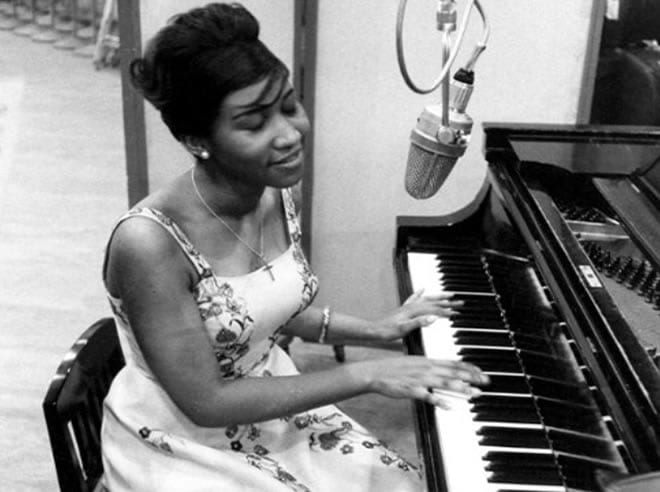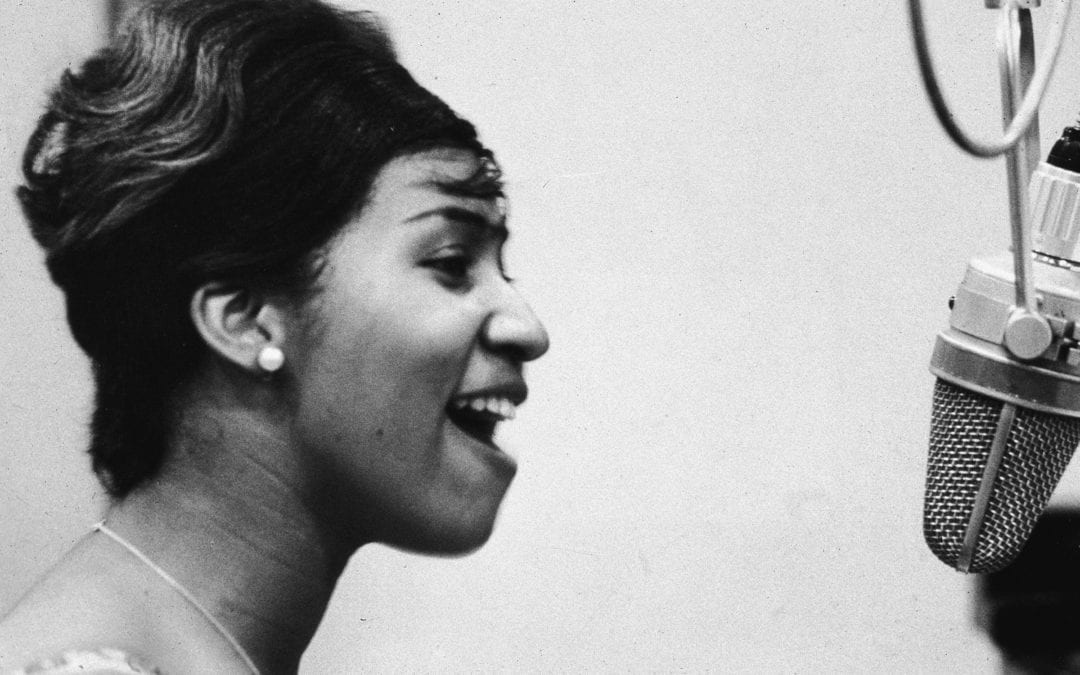[A Little Background.]
Ninetynine percent of you will know the hits. The stuff for which everyone on earth knew her. Hell, if it weren’t for FM radio in the 70s, I wouldn’t have had my introduction: 1967’s classic, “Respect”.
She was spelling a word, my little four-year-old brain realized. I was at that time really into spelling words, counting, and that sort of thing. I watched Sesame Street, and sang simpler songs about rubber duckies, and such. But I remember riding in my dad’s Chevette when a gnarly song called “Respect” came on. This was back when tykes were allowed to ride in the front seat, routinely without a seatbelt, and I started rocking back and forth. My Dad turned the knob up. I vividly remember this. Good for him, right?
R-E-S, P-E-C-T. (There was definitely a comma in there, the way she sang it.) By the time Aretha did her version, it was an old song, if two or three years can be called old. And, in the mid-60s, I think that is a fair assessment. I mean, the Beach Boys went from “Surfin Safari” to “California Girls” in only three years. The Beatles went from “Yesterday” to “Helter Skelter” in three years. Marvin Gaye went from “Pride and Joy” to “What’s Goin’ On” in four. And so it was that, back in ’64, “Respect” had already been established as a classic by the great Stax-Volt R&B singer Otis muthafuckin’ Redding. As in so many duets Otis did with Carla Thomas, he was speaking to a woman who’d done him wrong. He spoke to, and for, a crowd of fellas that had been perpetually shit on by the ladies they were with. He sang with a pain that rang true.
Okay, BUT: a fantastic way of turning it around, especially later in the 60s, was a lady telling her man exactly why he needs to step it up. Stop running around, stop demanding shit, stop being an asshole. And if he can’t, then fuck that guy. The lady can do better.

On some weird osmotic level, listening to this lady sing, my tiny little self understood this. This was a weird bit of revelation. I vaguely understood that men and women had relationships, but it never occurred to me that perhaps one party might have a grievance against the other. My mom and dad were (and oddly, still are) really into each other, so I only heard this idea when pop songs began to soak into my brain as a child.
[You Better Think.]
Flash forward twenty years or so. Having only recently discovered the “deep end” of 60s soul and R&B, I was only just getting exposed to James Brown at the Apollo, Sam and Dave, The Supremes, Marvin Gaye and the like. I was also just recently out of a shitty relationship, and was fond of using immense quantities of LSD.
So, uh, one evening I had the brilliant idea of eating about 8-10 tabs of acid and sitting in the dark and putting on headphones (a favorite practice of mine during the mid-90s), and putting on a record. I had a little touch-activated lamp above my turntable, so even in pitchblack (or Jet Black) darkness, I could hit the light, flip an LP over and lay the needle down.
The album I chose for that night was 1968’s “Aretha Now”. This part is important, folks. After the first weird incongruities hit me—the room looking like it’s shot through a funky camera filter, the tingles through the body, the twists in one’s spatial reasoning, the slight liquidity that textures every object—I put on the headphones and flipped off my lamp.
[Side one.]
I was just settling in for the first side of the album, when that bluesy piano kicked in. You all know the first song, “Think”. It’s a real humdinger. I was laying on the floor on my back. The vocals were as glorious as every other time I’d listened to Aretha, but the drums and bass were getting thicker and thicker. By the second song, “I Say a Little Prayer,” the guitar texture was a bit gnarlier. And the background vocals were punching through high and shiny. As sad and forlorn as this song is, there’s still a strange joy in it. This, I thought to myself, was sounding like a damn fine record. Track three, “See Saw,” sounds to me like Aretha is playing the piano herself. There’s something about the way it leads the bass and drums. And that guitar track was definitely built around it. This is where the album takes a bit of an upstride. And if that’s her on the piano, she is hammering it.
It was maybe this next song, “Night Time Is the Right Time,” where I realized, ‘Oh shit, here comes the acid.’ The song hit me like a ton of bricks. Or a tonne of briquettes. And this one is definitely Miss Aretha on piano. That solo still kills me. Then we go into “You Send Me”, where the full force of those Memphis session musicians comes in. That song is one of the most simple chord progressions ever, yet how it’s executed here makes all the difference.
[Side two.][Note: Now I know you kids don’t understand what a two-sided release is, but I’m here to educate you. Once upon a time, there was a two-sided plate that people placed onto a machine, which then rotated under a needle, and then you got music out of your speakers. After that there were also small encapsulated tape recordings which had a Side 1 and a Side 2, as well. And yes, I am being condescending.]
So, despite being incredibly high on psychedelics, your humble narrator managed to flip the record over. Eventually. I sat in silence for a bit before I did it. I was digesting, I suppose. I have a vague recollection of drinking a glass of water, using the bathroom, etc., and I almost certainly smoked another cigarette. But then: “You’re a Sweet Sweet Man”. That drum and vocal intro is fucking exquisite. The bass and horns come in immediately thereafter. Say what you will about the production skills of the cantankerous old Jewish dude named Jerry Wexler, but this fella is the shit. He was one of the masters of capturing the sound of a band playing together in a room. Which is a lost art. You can fucking hear the room. It was, and is, awesome to hear. Awesome in the literal sense, as in ‘inspiring awe’. So awesome I forgot for a moment I was listening to a record, and wasn’t actually in the room with these people. But I’m dumb. And in my defense: you know, drugs.
Listen to those drums and bass and backing vocals. All that was done because Jerry knew what he had in Aretha, this magnificent singer he’d just pushed Atlantic Records to sign. This is precisely the point of “I Take What I Want”.
“Hello Sunshine” This is the one where I began to suspect, or hope, I was peaking. This song basically took me over. I was no longer a dumb, young, white, extremely-high guy, laying on his back in the dark, listening to a record. Or rather, I was that and a few thousand other things, in a few thousand other places. I went into an ecstatic, vaguely religious state, where I was seeing things that weren’t there and feeling feelings I had never felt before, and most likely never would again. The silence at the end of that song was a huge chasm, and seemed to take ten minutes. (I can confirm, after just now listening to the record, that the silence is only about 3 or 4 seconds.)
Ready to be taken somewhere else, feeling a little drained and yet perky as hell, “A Change” seemed to come along at the exactly perrrrrrrfect time in my trip. The half-speaking, half-singing beginning of Aretha’s vocals are a nice touch. The reverby twang of that guitar is yet another bit of texture that perfectly captures that room in that studio at that time. Love that bass, too. The attitude in Franklin’s performance is pure gold, as well. Ooomph.
The final track, “I Can’t See Myself Leaving You,” was oddly apropos (thanks to the lysergic acid, I’m sure) for the experience I had just gone through, and the killer backing vox truly sell this one. As a kind of coda to the entire album, this song works quite well. There’s a kind of “default setting” Aretha and her band seem to have, especially in the ’67-’68 era—the crispness of the drums, the thump of the low-end piano and bass, the southern tinge to those trebly-ass guitars, the ever-present echo on the girls singing in the back, the immense, compressed-sounding horns, and of course that exquisite voice leading it all. In other artists, I would be tempted to think the uniformity of all these textures was formulaic, and maybe just plain lazy. With Wexler at the mixing board and Aretha up front, I doubt it was anything but calculated.
[If it ain’t broke, don’t fix it.]
I spent the next few hours flipping this record over and over. As I came back into near-Earth orbit, the album lost none of its gloss. The sun came up and the room looked as normal and mundane as it usually did, but the goosebumps of hearing some of the lady’s soprano “ooh”s stayed with me. And I still get a little taste of that to this very day.
So I had an extremely emotional night with Miss Aretha, and she didn’t even have to be there. It had a huge effect, perhaps permanent, on me. It’s a memory that has soaked into my innermost grain. This was one of the most beautiful nights I have ever had. Period.

